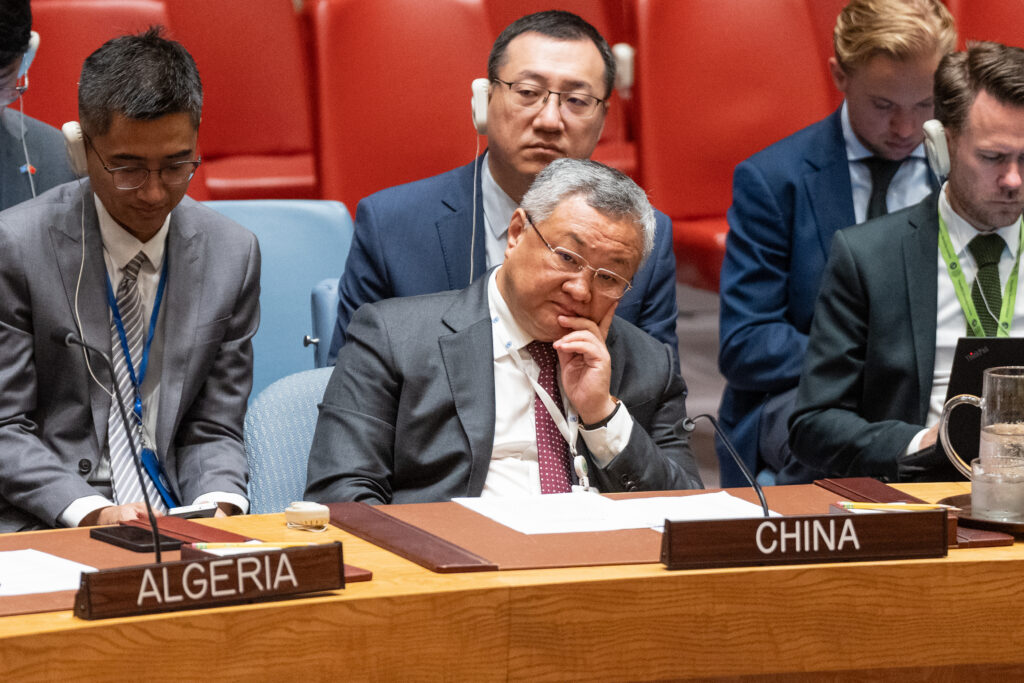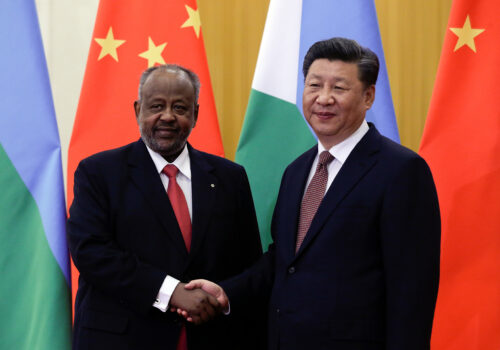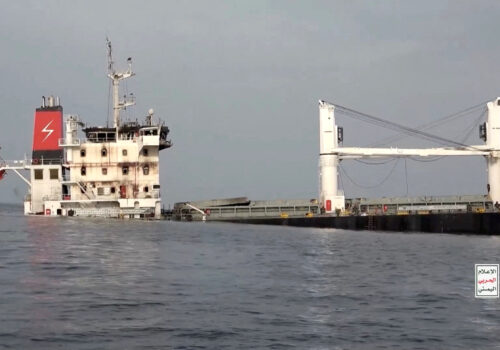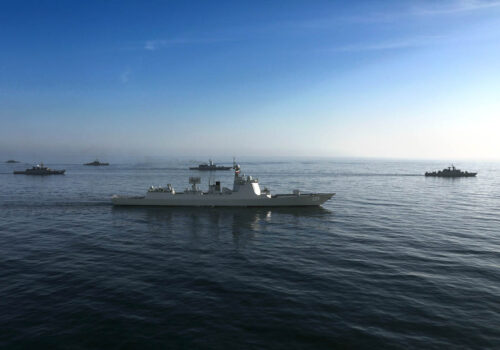In the aftermath of the Twelve Day War between Israel, the United States, and Iran, many experts have argued that the weaknesses of China’s Middle East and North Africa (MENA) strategy have been exposed. These comments come despite China appearing to have, in recent years, started to make its mark in the region.
For example, in 2023, Beijing hosted Saudi Arabia and Iranian officials to announce the normalization of ties between Riyadh and Tehran. That same year, it invited now-ousted Syrian leader Bashar al-Assad to Hangzhou and welcomed a special delegation on Gaza from Saudi Arabia, Egypt, Jordan, the Palestinian Authority, and Indonesia. Just months later, representatives of Palestinian factions met in Beijing to issue the Beijing Declaration on Ending Division and Strengthening Palestinian National Unity.
While not as involved as Russia, China bolstered its role in the region and did not seem a distant or secondary player anymore.
Yet, today Gaza remains starved and occupied, there is no unity among the Palestinians, and, especially, the so-called “Axis of Resistance” composed of Iran and its regional proxies hardly exists anymore after the Israeli multifront campaign which led to the direct bombing of Iran, as well as the sudden collapse of Syria’s Assad regime in December 2024.
Ultimately, the volatility of Chinese gains can largely be traced back to the fact that the MENA region’s importance in Beijing’s foreign policy is limited and, thus, not much energy and resources are invested in long-term planning. This results in a low-commitment approach that allows China to pick low-hanging fruit while placing it in a passive and reactive position in times of crisis and regional change.
Hence, China’s fortunes in the MENA region are far more dependent on trends there than sophisticated strategizing.
Priorities
Similar to other countries, China’s leadership spends most of its time on domestic issues, from figuring out how to turn the country into a “mega-sized consumer powerhouse” to managing the gigantic Chinese Communist Party machine. If one takes the Politburo study sessions (i.e., meetings in which the country’s twenty-odd most powerful people meet to listen and interact with one or two experts on topics picked by Xi for about two hours) as a proxy of Beijing’s priorities, foreign policy’s relatively low priority ranking becomes evident. It only stood out during Xi’s first term as China’s top leader. After that, the number of relevant meetings evidently declined to the same level as, or an even lower level than, during the years of his predecessor, Hu Jintao, and was far lower than the number devoted to economic, social, and party affairs. Even in Xi’s “new era,” foreign policy ambitions do not displace domestic preoccupations.
With foreign policy taking up a fraction of the leadership’s working time, China’s relations with certain countries and regions are more important than others. In the classic China’s Search for Security, Andrew J. Nathan and Andrew Scobell point out that “China’s immediate periphery has a good claim to be the most challenging geopolitical environment in the world for a major power” due to the presence of nuclear-armed neighbors and unresolved disputes that involve extra-regional powers. Hence, unsurprisingly, relations with neighboring countries and the United States have long been the focus of Chinese foreign policy. The patterns of overseas visits made by Chinese leaders show this well. The same holds true when looking at how being assigned to work on those countries or regions shapes the chances of rising through the ranks of the Ministry of Foreign Affairs.
In this context, I find it useful to describe the MENA region as one of the most important among the least important regions. As Mohammed Alsudairi and I show in a forthcoming book, the writings of Chinese experts and former foreign policy professionals are clear in this regard. There is no doubt that much is at stake for China in the region. The region is the place of origin for 40 to 50 percent of oil and a slightly smaller share of natural gas. At the same time, China’s economic presence in the region is rapidly diversifying, from the 2016-announced “1+2+3 cooperation model” to the addition of cooperation in cloud computing and artificial intelligence. Beyond energy and economic relations, conflicts and terrorism in the region shape China’s approach to key concepts such as the responsibility to protect (R2P), while also providing opportunities to criticize the United States for its military interventions and accuse Washington of fueling regional instability.
Yet, none of China’s so-called “core interests” are at stake. Beijing receives consistent support from many countries in the region on issues such as Taiwan and the South China Sea. China’s ethnic and religious policies in the Xinjiang Uyghur Autonomous Region are not only often endorsed but, at times, even used by some regional governments to justify their own repressive actions toward groups like the Muslim Brotherhood. None challenge the leading position of the Chinese Communist Party.
When it comes to energy security, China has been working hard to diversify its suppliers, sign long-term contracts, and expand the electrification of its economy. For example, the total electric truck fleet alone is already displacing over one million barrels per day in implied oil demand, which is roughly the equivalent to the daily oil production of Oman, according to a report from the Rodium Group. Reportedly, the fear that the Strait of Hormuz could be blocked during the Twelve Day War made China and Russia reconsider the stalled Power of Siberia Two pipeline after years without any progress. In December 2024, Sinopec estimated that Chinese oil imports will peak in 2027, while the country’s strategic reserves continue to expand. Hence, as a recent Center for Strategic and International Studies report argues, “despite notable challenges China faces in energy security, it is in an increasingly strong position to overcome surging demand, environmental costs, import reliance, and energy infrastructure.” In other words, reliance on MENA energy producers is significant, but it does not mean that Beijing has to constantly pay attention to the region in normal times.
As to the Chinese economic and human footprint, it is increasingly concentrated in a few countries, mostly in the Gulf, that are seen as stable. Additionally, recent data from the Chinese Ministry of Finance suggest that the aggregate value of Chinese investment in the region is plateauing. As such, the threat to Chinese assets and citizens has been decreasing in comparison with the past.
Delegation and outcomes
The important-but-not-so-important nature of Chinese interests in the MENA region means that much of the country’s diplomacy there is delegated from the top leaders, probably including Chinese Foreign Minister and Politburo member Wang Yi, to the bureaucrats within the various ministries under the State Council and, of course, the large state-owned companies. Such a policymaking configuration typically produces strong path dependence and a reactive approach to events on the ground. The decisions made are usually ad hoc.
Strong evidence in support of this description of decision-making in Beijing can be found in the writings of Chinese experts and former foreign policy professionals. Over the past ten years, they have consistently highlighted how Chinese diplomacy in the MENA region constantly suffers from a lack of coordination among the many agencies and organizations that act, or declare to act, on behalf of the central government. Related to this, it is important to highlight the siloed nature of Chinese decision-making institutions that do not favor interagency cooperation. Moreover, while Chinese diplomats in the MENA are often highly experienced operators who have built their careers by serving in different countries there, recent studies show that this makes them less likely to reach leadership positions within the Ministry of Foreign Affairs. As such, information coming from the region might not always be the basis upon which Chinese leaders make their decisions.
In the face of a long-standing debate about how to approach the United States in the region, with some arguing against direct confrontation and some being in favor of it, no consensus has emerged. At the same time, the experts often complain, China is too reactive in how it approaches the MENA region. Yet, they usually fail to articulate what kind of more proactive actions should be taken. This can again be seen as symptomatic of a lack of clear input and of little interest in investing additional resources by top leaders, who have other, more urgent matters to address.
Naturally, these facts alone do not explain the ups and downs of China’s real or perceived influence in the region. Yet, combined with what is known about the normalization of Saudi-Iranian ties and the announcement of the Beijing Declaration, they shed considerable light on this issue. As discussed in detail elsewhere, China’s role in spring 2023 was mostly performative as both Saudis and Iranians had long agreed that both wanted to stabilize their relations. China was likely chosen because of its good ties with both countries, which could also benefit from giving a win to China. Palestinian sources suggest a somewhat similar scenario with regard to the Beijing Declaration. China did little, but some Palestinian factions were eager to ingratiate themselves with Beijing.
Hence, China’s influence likely grows when regional dynamics are favorable to it and there are opportunities to act that do not put too much stress on its policy-making system. The corollary of this, however, is that its fortunes can quickly reverse when the facts on the ground change, and Beijing is left waiting and hoping that the damage will not be too great.
Yet, it is important to emphasize that Beijing ultimately can afford this. While the Twelve Day War clearly showed that China is not a country that one should rely on when diplomatic statements are not enough, its permanent seat on the Security Council and its economic prowess make it an actor that regional players cannot afford not to stay on good terms with when the dust settles.
Could China’s approach change? After the Arab Spring, there was a deep rethinking in Beijing with regard to the role of the military in foreign policy, leading to the opening of its base in Djibouti. China’s vetoes over Syria also originate from the fear that Western countries would topple Assad like they did with the former leader in Libya, Muammar Gaddafi. Therefore, something truly damaging for China’s interests, like if the Strait of Hormuz is closed or Iran implodes, might indeed trigger some kind of reorientation or major investment in China’s regional policy. Until then, expect more short-lived ups and downs in Chinese influence as the region changes—but Beijing does not.
Andrea Ghiselli is a lecturer in international politics in the Department of Social and Political Sciences, Philosophy, and Anthropology of the University of Exeter. He is a non-resident research fellow at the TOChina Hub and the head of research of the ChinaMed Project. He is affiliated with the Torino World Affairs Institute.
Further reading
Thu, Jul 31, 2025
Djibouti is the next arena for US-China competition in the Red Sea
MENASource By Emily Milliken
Washington could upgrade its Djibouti relationship and secure its foothold along some of the world’s most important waterways.
Wed, Jul 23, 2025
Iran, China, Russia, and the collapse of deterrence in the Red Sea
MENASource By
Multiple powers now patrol with different mandates, different rules, and increasingly different interpretations of acceptable behavior.
Fri, Jun 13, 2025
China’s basing quest in the Gulf: Pipe dream or strategic reality?
MENASource By
While the Gulf remains central to China’s long-term maritime aspirations, its near-term military footprint is likely to stay limited.
Image: July 23, 2025, New York, New York, United States: Ambassador Fu Cong of China attends UN Security Council meeting on the situation in the Middle East, including the Palestinian question at United Nations Headquarters in New York on July 23, 2025. Pakistan holds Presidency of UNSC for the month of July. (Credit Image: © Lev Radin/Pacific Press via ZUMA Press Wire)




